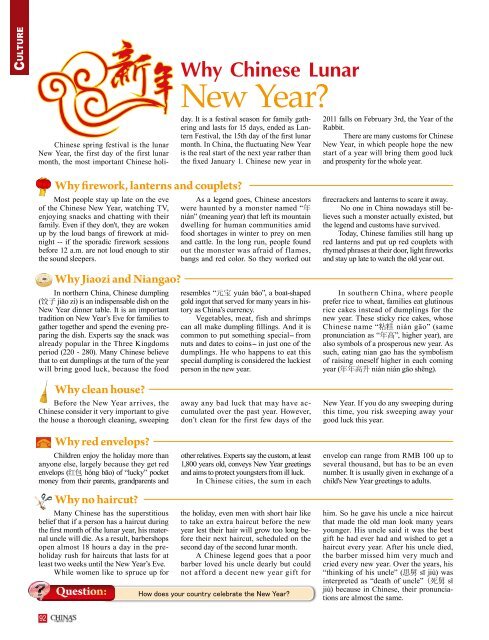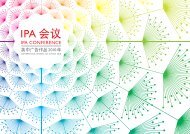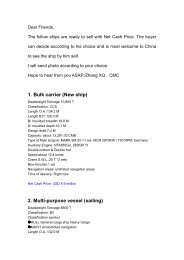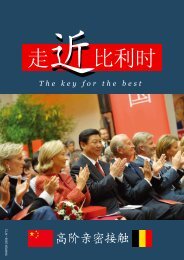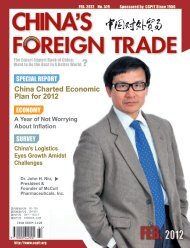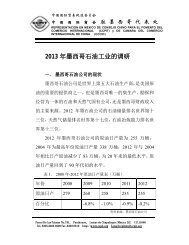Create successful ePaper yourself
Turn your PDF publications into a flip-book with our unique Google optimized e-Paper software.
Culture<br />
Why Chinese Lunar<br />
Chinese spring festival is the lunar<br />
New Year, the first day of the first lunar<br />
month, the most important Chinese holi-<br />
New Year?<br />
day. It is a festival season for family gathering<br />
2011 falls on February 3rd, the Year of the<br />
and lasts for 15 days, ended as Lan-<br />
Rabbit.<br />
tern Festival, the 15th day of the first lunar There are many customs for Chinese<br />
month. In China, the fluctuating New Year New Year, in which people hope the new<br />
is the real start of the next year rather than start of a year will bring them good luck<br />
the fixed January 1. Chinese new year in and prosperity for the whole year.<br />
Why firework, lanterns and couplets?<br />
Most people stay up late on the eve<br />
of the Chinese New Year, watching TV,<br />
enjoying snacks and chatting with their<br />
family. Even if they don't, they are woken<br />
up by the loud bangs of firework at midnight<br />
-- if the sporadic firework sessions<br />
before 12 a.m. are not loud enough to stir<br />
the sound sleepers.<br />
Why Jiaozi and Niangao?<br />
In northern China, Chinese dumpling<br />
( 饺 子 jiǎo zi) is an indispensable dish on the<br />
New Year dinner table. It is an important<br />
tradition on New Year’s Eve for families to<br />
gather together and spend the evening preparing<br />
the dish. Experts say the snack was<br />
already popular in the Three Kingdoms<br />
period (220 - 280). Many Chinese believe<br />
that to eat dumplings at the turn of the year<br />
will bring good luck, because the food<br />
Why clean house?<br />
Before the New Year arrives, the<br />
Chinese consider it very important to give<br />
the house a thorough cleaning, sweeping<br />
Why red envelops?<br />
Children enjoy the holiday more than<br />
anyone else, largely because they get red<br />
envelops ( 红 包 hóng bāo) of “lucky” pocket<br />
money from their parents, grandparents and<br />
Why no haircut?<br />
Many Chinese has the superstitious<br />
belief that if a person has a haircut during<br />
the first month of the lunar year, his maternal<br />
uncle will die. As a result, barbershops<br />
open almost 18 hours a day in the preholiday<br />
rush for haircuts that lasts for at<br />
least two weeks until the New Year’s Eve.<br />
While women like to spruce up for<br />
Question:<br />
As a legend goes, Chinese ancestors<br />
were haunted by a monster named “ 年<br />
nián” (meaning year) that left its mountain<br />
dwelling for human communities amid<br />
food shortages in winter to prey on men<br />
and cattle. In the long run, people found<br />
out the monster was afraid of flames,<br />
bangs and red color. So they worked out<br />
resembles “ 元 宝 yuán bǎo”, a boat-shaped<br />
gold ingot that served for many years in history<br />
as China’s currency.<br />
Vegetables, meat, fish and shrimps<br />
can all make dumpling fillings. And it is<br />
common to put something special- from<br />
nuts and dates to coins- in just one of the<br />
dumplings. He who happens to eat this<br />
special dumpling is considered the luckiest<br />
person in the new year.<br />
away any bad luck that may have accumulated<br />
over the past year. However,<br />
don’t clean for the first few days of the<br />
other relatives. Experts say the custom, at least<br />
1,800 years old, conveys New Year greetings<br />
and aims to protect youngsters from ill luck.<br />
In Chinese cities, the sum in each<br />
the holiday, even men with short hair like<br />
to take an extra haircut before the new<br />
year lest their hair will grow too long before<br />
their next haircut, scheduled on the<br />
second day of the second lunar month.<br />
A Chinese legend goes that a poor<br />
barber loved his uncle dearly but could<br />
not afford a decent new year gift for<br />
How does your country celebrate the New Year?<br />
firecrackers and lanterns to scare it away.<br />
No one in China nowadays still believes<br />
such a monster actually existed, but<br />
the legend and customs have survived.<br />
Today, Chinese families still hang up<br />
red lanterns and put up red couplets with<br />
rhymed phrases at their door, light fireworks<br />
and stay up late to watch the old year out.<br />
In southern China, where people<br />
prefer rice to wheat, families eat glutinous<br />
rice cakes instead of dumplings for the<br />
new year. These sticky rice cakes, whose<br />
Chinese name “ 粘 糕 nián gāo” (same<br />
pronunciation as “ 年 高 ”, higher year), are<br />
also symbols of a prosperous new year. As<br />
such, eating nian gao has the symbolism<br />
of raising oneself higher in each coming<br />
year ( 年 年 高 升 nián nián gāo shēng).<br />
New Year. If you do any sweeping during<br />
this time, you risk sweeping away your<br />
good luck this year.<br />
envelop can range from RMB 100 up to<br />
several thousand, but has to be an even<br />
number. It is usually given in exchange of a<br />
child's New Year greetings to adults.<br />
him. So he gave his uncle a nice haircut<br />
that made the old man look many years<br />
younger. His uncle said it was the best<br />
gift he had ever had and wished to get a<br />
haircut every year. After his uncle died,<br />
the barber missed him very much and<br />
cried every new year. Over the years, his<br />
“thinking of his uncle” ( 思 舅 sī jiù) was<br />
interpreted as “death of uncle” ( 死 舅 sǐ<br />
jiù) because in Chinese, their pronunciations<br />
are almost the same.<br />
92


